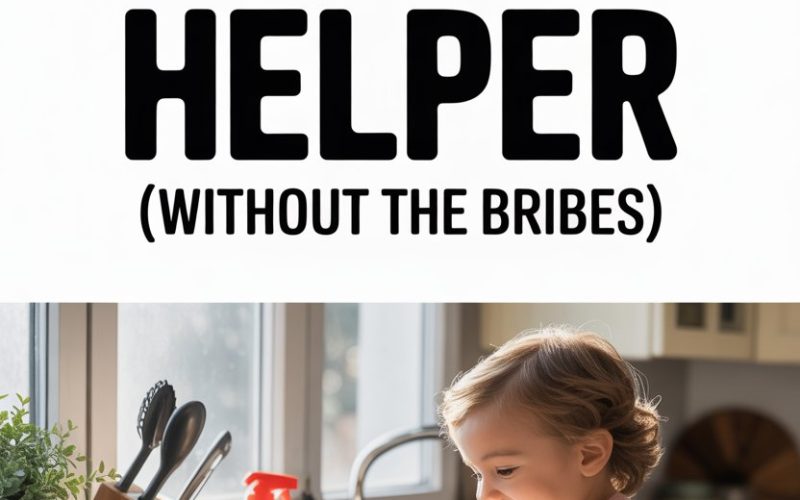If you’re hoping to raise a child who actually pitches in without expecting a new LEGO set for every dry dish, welcome. You’re not alone in your quest.
The dream is real: kids who help because it feels good, not because it pays well in jelly beans.
Here’s how to nurture that spirit, even when the clock’s ticking, dinner’s burning, and the dog’s chewing your work shoes.
Tiny Humans Need to Feel Useful
Tiny hands ache to be needed. Even toddlers, those miniature chaos tornadoes, crave a sense of importance.
Research from the University of Minnesota shows that children as young as three enjoy helping and will do so enthusiastically when allowed. This eagerness to contribute is hardwired, not just a product of parental nagging.
The next time your child tugs at your sleeve while you’re wrestling with laundry, try handing them a pile of socks to sort. Sure, they might create a few unconventional pairs, but they’ll feel like part of the team.
And honestly, who’s checking if Dad wears two different shades of navy?
Let Go of Perfection (Seriously, Let It Go)
If you’re someone who alphabetizes the spice rack, relax your standards. Kids are more likely to help if they’re not constantly critiqued or “corrected” while they’re learning.
When a five-year-old wipes down a benchtop, there will be streaks and possibly a new sticky spot that wasn’t there before. This is normal.
Show them, praise the effort, and resist the urge to redo their work in front of them. Kids see right through the “Thanks, darling!” followed by a sneaky parental re-clean.
Give them room to improve, not to feel like failures. Eventually, their skills (and your eye twitch) will improve.
Big Up the Teamwork
Kids aren’t born understanding why chores exist. To them, the laundry pile is just a soft mountain for jumping off the couch. Explain that families work together to keep things ticking along.
Use phrases like “In our family, we all help each other,” or “We get things done quicker when we work as a team.” This transforms chores from solitary punishment to a family event.
Play music, race the clock, or invent silly “cleaning dances” and suddenly the vibe is less prison yard, more conga line.
Give Real Choices (But Not Too Many)
Children love autonomy almost as much as they love glitter glue. Allow them to choose between two age-appropriate tasks—say, setting the table or feeding the cat.
This gives them a sense of control but within set boundaries.
Too many options, though, and you’ll have a child paralysed by indecision, bargaining up a storm (“I’ll tidy the lounge if I can skip bath night forever”).
Two or three choices is enough. You’re still the captain of this ship.
Timing Is Everything
Kids are more likely to help when they’re not exhausted, starving, or mid-meltdown because Paw Patrol ended five minutes early.
Pick your moments. Invite them to join in when you’re both in decent moods and there’s time for a bit of back-and-forth.
Rushing a child through a task is a recipe for sulking, resistance, and possibly a broken plate or two.
Build “helping time” into your daily routine—maybe before dinner, or right after school—so it becomes as habitual as teeth brushing (or, you know, arguing about teeth brushing).
Praise the Process, Not the Payoff
Sticker charts and lollies have their place, but over time, they can backfire. Kids start to weigh every request: “What’s in it for me?” Next thing you know, you’re negotiating with a pint-sized union leader.
Celebrate their effort and perseverance: “You put a lot of work into folding those towels!” or “Thanks for helping me carry the shopping bags.
That made things so much easier.” This builds an internal motivation, which sticks around even when no one’s promising chocolate buttons.
Psychologists refer to this as “intrinsic motivation,” and it’s the golden ticket for raising long-term helpers. Praising the effort, not just the result, nurtures this drive.
Make Helping Part of the Routine, Not a Special Event
Kids are creatures of habit. If helping out feels like a punishment or a special project, it never quite sticks.
Instead, weave small tasks into their regular schedule: clearing their own plate, putting away toys before bath time, matching socks before a story.
These moments add up, and suddenly, you have a child who doesn’t flinch at the words “tidy up.” Or at least, not every time.
Model the Behaviour You Want to See
Little eyes are always watching—often when you least want them to. If you sigh and grumble your way through chores, your child will learn to see them as a burden.
If you approach them with a sense of humour (and possibly your best 80s dance moves), they’re more likely to join in.
Voice your sense of accomplishment: “Look at us! The kitchen’s sparkling!” Or, after a group effort, plop down and admire your handiwork together—even if you’re both exhausted and slightly soggy from mopping.
Start Small and Build Up
It’s tempting to dream of a seven-year-old who can whip up dinner and fold a fitted sheet with military precision, but start with the basics.
Young children can put toys back in a box or wipe the table with a damp cloth. Older kids can take out rubbish, pair shoes by the front door, or help water the plants.
As they gain confidence (and height), add new responsibilities. No need to throw them in at the deep end with an IKEA assembly project just yet.
Deal with Pushback like a Pro
Some days, your child will dig in their heels. On those days, you might consider moving to a remote island. Or just calmly remind yourself: resistance is normal, not a sign of parental failure.
Try empathising with their reluctance (“I know you’d rather be playing, but we all need to help tidy up so we can have more time together”).
Offer to work alongside them—sometimes, the real objection is not wanting to feel left out while everyone else is busy or relaxing.
If you’re met with serious defiance, don’t threaten or bribe. Consistency and clear expectations work far better over time.
Stand your ground, keep calm, and remember: No one ever won a power struggle with a five-year-old.
Don’t Wait for Perfect—Celebrate Progress
You might spot families on Instagram whose children appear to fold towels with military precision and smile serenely throughout. Good for them.
In real homes, progress is messy. Some days, the only thing your child “helps” with is relocating every dust bunny in the house.
Celebrate the small wins. Over time, those little helpers grow into bigger ones, and the skills they learn now will serve them for life (and maybe spare their future flatmates).
When Helping Becomes Habit
Raising a little helper isn’t about turning your home into a miniature sweatshop or squashing your child’s spirit. It’s about fostering a sense of belonging, contribution, and pride.
Kids who feel competent and appreciated are more likely to pitch in, even without promises of plastic treasures or a parade.
Stay patient, stay consistent, and celebrate the little milestones. One day, you’ll look around the kitchen mid-dinner-chaos and realise—someone, without being asked, just wiped the table.
And that’s worth more than all the jelly beans in the world.




